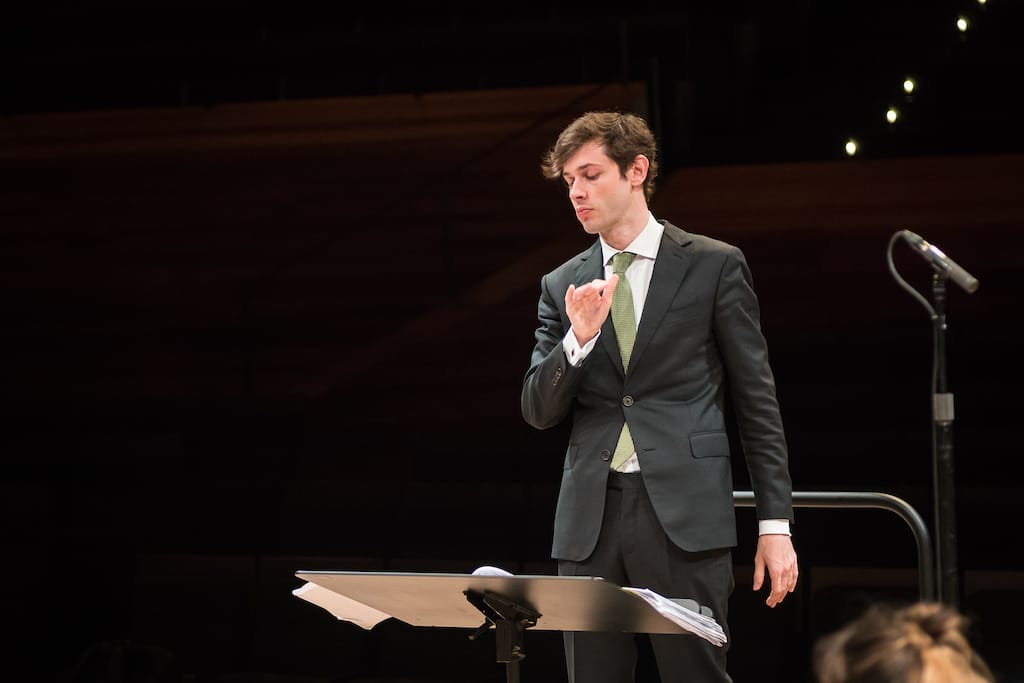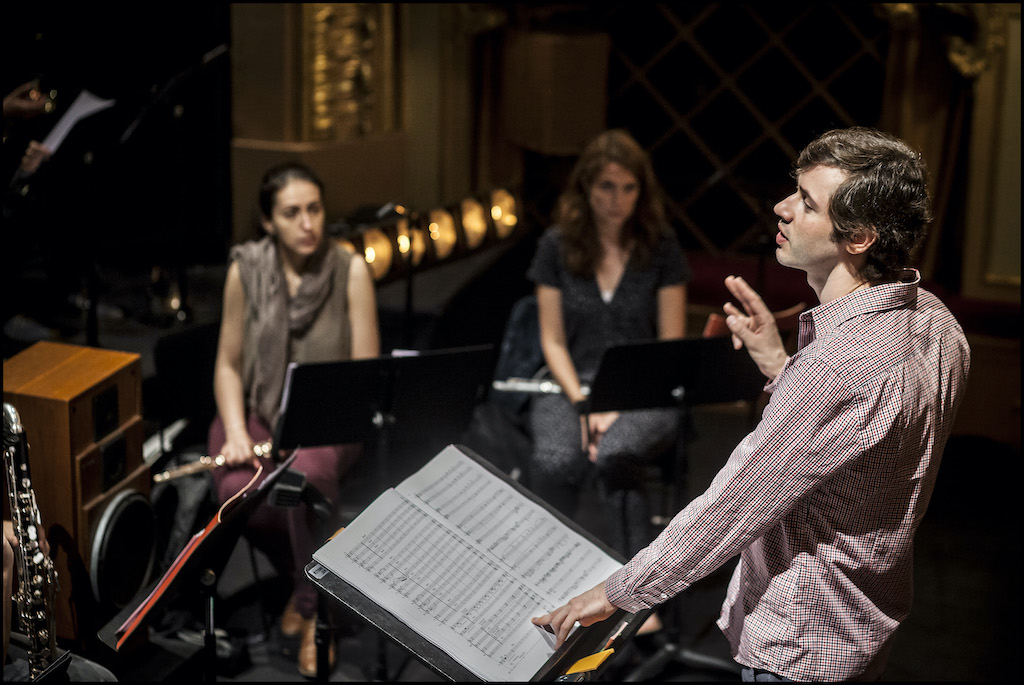Maxime Pascal conducts ‘The Greek Passion’ in Salzburg

For the first time, the Salzburg Festival presents Bohuslav Martinů’s four-act opera The Greek Passion this summer. The libretto by the composer is based on Nikos Kazantzakis’ novel Christ Recrucified. The action is timeless and topical, and parallels with current events cannot be overlooked: the inhabitants of a Greek village celebrate Easter. United in their faith, they are told by their priest Grigoris which of them have been selected as performers for the Passion play in the coming year. Shortly thereafter, their community is torn apart by the sudden arrival of a group of exhausted refugees asking the wealthy village for help and asylum. The event either reduces the inhabitants‘ Christian values to mere lip service, or it becomes the driving force of their actions. The conflicts between those supporting the refugees and those who are against them come to such a dramatic head that the Passion story that had been envisioned as a theatre performance is tragically acted out in reality. The villagers promoting humanity, empathy and charity – chief among them the shepherd Manolios – are unavoidably confronted with the power structures of a saturated society fearing for its status quo.
Martinů himself shared the fate of people robbed of their homeland: he was born in the borderlands of Bohemia and Moravia in 1890. Originally a self-taught composer, he began studying with Josef Suk in 1922 and moved to Paris in 1923 to study with Albert Roussel. He remained in France for 17 years, familiarizing himself with French music and its clarity, order and balance.
In the mid-1920s, Martinů encountered the Groupe des Six, jazz and Igor Stravinsky, among others. During the 1930s, neo-classicism was the main influence on Martinů’s compositional output. After Paris was occupied by the Nazis, Martinů first fled to the South of France (Aix- en-Provence), emigrating from there to the USA in 1941, with the support of Swiss friends. In 1952 he obtained American citizenship. Even though Martinů was appointed a professor at the Prague Conservatory after the war, the reconstitution of the government under Communist leadership enforced by Stalin prevented him from returning to his homeland. In 1953, Martinů moved back to Europe. He originally settled in France, but relocated to Switzerland in 1956, where he spent his last years. He never returned to his homeland.

The French conductor Maxime Pascal, born in 1985, spent his youth in Carcassonne in the South of France. In 2005 he took up his studies at the Conservatoire National Supérieur de Musique et de Danse in Paris. While still a student, he founded the orchestra Le Balcon with fellow artists in 2008, naming it after a play by Jean Genet. To this day, he remains the artistic director of this orchestra. In 2014 he won the Young Conductors Award and has performed several times at the Salzburg Festival, most recently leading a concert performance of Wolfgang Rihm’s Jakob Lenz, which was included in the New York Times’ selection of the best performances of 2022.
Maxime Pascal summarizes his personal ideas about musical theatre by stating that every performance should be “an impressive and radical – in the original sense of the word – experience for the audience”. He has sought out collaboration with artists such as Pierre Boulez, Péter Eötvös, Michaël Levinas and Arthur Lavandier.
This summer, Maxime Pascal conducts his first staged opera production at the Salzburg Festival: Bohuslav Martinů’s The Greek Passion. The premiere takes place at the Felsenreitschule on 13 August; three further performances follow on 18, 22 and 27 August.

Salzburg Festival: You founded the orchestra Le Balcon together with fellow artists when you were quite young. When did you decide to be a conductor?
Maxime Pascal: That was when I was about 21. Being a conductor, however, is not something that I decided specifically. Over time, I realized almost subconsciously that my life and thinking were developing in that direction. There was no moment in which I suddenly said: “Oh, I want to be a conductor.” It didn’t happen on this rational level; it was more of an intuition. I didn’t know where this path would lead me, but I did know very clearly that I had to follow it.
SF: This summer will see you conduct the Vienna Philharmonic for the first time, and in a new opera production at that. How did that come about?
MP: That is a dream come true. I am extremely grateful that Markus Hinterhäuser has given me the opportunity to conduct The Greek Passion in Salzburg. It is important to me to serve the music and the composer, and also the orchestra. I see my task in letting the audience hear exactly what the intention of Martinů and Kazantzakis was.
SF: But it’s not all about service. You also have to have leadership qualities in order to convey your ideas as a conductor. How do you work with an orchestra, in general?
MP: I try to be something like a living score which the musicians can read. In my work, they should recognize which sonic colours should be audible, how the sound should be balanced, where the harmonic and melodic development is heading. I try to show all that, so that looking from the outside, one can ultimately say: this conductor has a clear vision, a powerful idea. The conductor should convey the exact nature of the work to the musicians – not what he wants the work to be.
SF: Have you studied Martinů’s work previously? What fascinates you about The Greek Passion in particular?
MP: Martinů’s music is full of great, profound sensitivity. I’m familiar with the opera Julietta, one of his most well-known works, and several chamber music pieces. The Greek Passion is his 14th and last opera, a fascinating piece. It starts with its literary model. The opera is based on a novel by Nikos Kazantzakis which is about the subject of exile, among others – an issue that ran through Martinů’s life. Reading the book and the libretto, I was deeply moved. The action repeats the Passion of Christ – in a different era, a different place and with different protagonists. This also means that Christ will be resurrected anew in each of our four Salzburg performances of The Greek Passion. The notion of resurrection expressed by Martinů here also describes the work we do as musicians in general: we play and interpret this or that symphony over and over – one could consider it a kind of liturgy.
In The Greek Passion, two groups clash, and therefore there are two choruses: on the one hand the villagers, on the other the refugees, who are mainly confronted with egoism and rejection. It is interesting that the group of villagers “inhabits“ the stage, so to speak – it is rooted there. For the group of refugees, however, Martinů explicitly noted in the score that they arrive from far away: at first, one only hears the chorus from afar, and it moves towards the stage while singing, finally entering it. In the further course of the action, the refugee chorus stays “mobile”, and at the end of the opera it moves off into the distance again, until it is only heard from very far off. That has a very strong effect.
SF: And then there is the children’s chorus …
MP: Right. After being rejected by the village priest, the refugees retreat to a mountain, invited by a few compassionate villagers; they explicitly talk about settling there. And at this point, we hear the children’s chorus, symbolizing their new roots.
SF: There are two versions of The Greek Passion; in Salzburg, the so-called “Zurich version” will be performed. Why this one?
MP: This second version was chosen mainly by Markus Hinterhäuser and Simon Stone. We will, however, not perform the German translation in which it was premiered in 1961, but the English original. The first version was conceived by Martinů for the Royal Opera House in London, but the opera was ultimately rejected there. The Zurich Opera House was willing to perform the work, but demanded changes. Thereupon, Martinů completely revised the work. The Zurichversion is more stringent and effective; the story is told in a more straightforward fashion, and the colours and “perfume” of the score are more highly concentrated.
SF:You just mentioned that you read the novel by Nikos Kazantzakis. Does literature inspire you in general, with regard to music?
MP: To me, that is a very important question, for literature is my main source of inspiration – even though that may seem unusual for a musician. Most of the images I develop with regard to music are fed by poetry and literature. I am very fond of Hermann Hesse, James Joyce and Jean Genet, for example. Another author who is very important to me is Gaston Bachelard, a French philosopher and poet. He plays an important role in France and has written significantly about the natural elements in art. I recognize these elements in music as well. I expend great effort on making the sound of music audible like water, air or earth.
In this context, another aspect of The Greek Passion is remarkable: namely how sunny and luminous the harmonies are. This may sound crazy and is hard to describe, but even in the most aggressive moments we still feel a sunny, bright light shine through the music. This phenomenon of light can be observed, for example, in the way Martinů writes for woodwinds.
SF: The Greek Passion is about humanity versus egoism. How do you view this contrast?
MP: As long as there are expulsions and persecution of human beings, there will be conflicts such as the one described in this opera between the villagers and the refugees. In the concrete case, the conflict arises despite the two groups sharing the same religion – both are Christians. Some of them are already persecuted, the others are not (yet). It is horrifying to consider the parallels with current events. The work is a plea for humanity, and fits into our own time perfectly.
SF: You will be conducting at the Felsenreitschule for the fourth time. How would you describe the acoustics and the aura of this performance venue?
MP: It is a unique place; I love conducting at the Felsenreitschule. This is my first time conducting an opera there; so far it was all concerts. Interestingly, Arthur Honegger’s Jeanne d’Arc au bûcher last year was also a kind of passion, dealing with persecution by an inimical crowd of people. The Felsenreitschule is special because of the building’s physical conditions: the walls of modern concert halls are usually panelled in wood, while at the Felsenreitschule – as in most churches – we are confronted mainly with stone. The acoustics are not those of a church, but to me, the Felsenreitschule falls somewhere between the acoustics of a church and a concert hall. In any case, the sound is unique.
SF: You will conduct the Concert Association of the Vienna State Opera Chorus and the Salzburger Festspiele und Theater Kinderchor. Tell us something about your working method.
MP: I very much enjoyed collaborating with Wolfgang Götz and the children’s chorus last year in Jeanne d’Arc. I have met several times with the director of the Concert Association of the Vienna State Opera Chorus, Huw Rhys James. I will rehearse separately with the individual choruses at first, then put all of them together.
SF: Are you familiar with productions by the director Simon Stone?
MP: Of course I saw his Salzburg production of Aribert Reimann’s Lear under Ingo Metzmacher. The Greek Passion is our first collaboration, and planning and talking to Simon Stone make me look forward immensely to our joint production.





